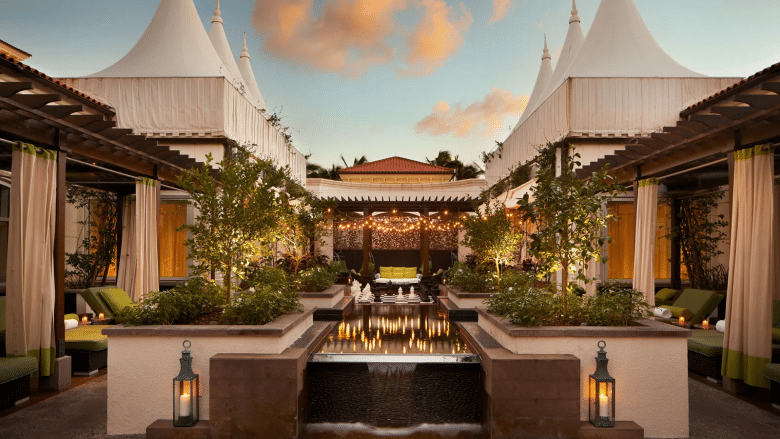In an era where social media wields unparalleled influence, the luxury hospitality sector is increasingly turning to influencer marketing to captivate discerning travelers. Once the domain of celebrities and A-listers, influencer marketing has evolved, becoming a pivotal marketing strategy for luxury hotels and resorts aiming to enhance their brand presence, drive bookings, and establish a loyal clientele.

The Rise of Influencer Marketing
Influencer marketing leverages individuals with substantial social media followings to promote products and services. In the context of luxury hospitality, these influencers often include travel bloggers, lifestyle gurus, and celebrities whose endorsements can significantly impact their followers’ choices. The shift towards influencer marketing is rooted in the changing dynamics of consumer behavior. Modern travelers, especially millennials and Generation Z, prioritize authenticity and personal recommendations over traditional advertising.
Crafting Authentic Experiences
Luxury hotels and resorts are not merely seeking influencers with vast followings; they are focusing on those whose followers align with their target demographic. For example, a luxury resort in the Maldives might collaborate with an influencer known for high-end travel content. The authenticity of the influencer’s endorsement plays a crucial role. Followers are more likely to trust and be inspired by genuine experiences rather than overtly promotional content.
Influencers are invited to experience the resort’s offerings firsthand, often sharing their journeys in real-time through Instagram stories, TikTok videos, and YouTube vlogs. This strategy provides potential guests with a virtual tour of the resort, showcasing its unique features, amenities, and experiences. The immersive content created by influencers offers an authentic glimpse into what a stay at the resort entails, effectively enticing their audience.
Strategic Collaborations
Successful influencer marketing campaigns in luxury hospitality are characterized by strategic collaborations. Resorts often partner with influencers to create bespoke content that highlights specific aspects of the property. For instance, a collaboration might focus on the culinary experiences offered by the resort, with the influencer documenting a gourmet dining experience curated by the resort’s executive chef. Alternatively, a wellness influencer might highlight the resort’s spa facilities and wellness programs.
These collaborations are meticulously planned, ensuring that the content resonates with the influencer’s audience while aligning with the resort’s brand values. The goal is to create a seamless narrative that integrates the influencer’s personal brand with the resort’s unique selling points.
Measuring Success
The effectiveness of influencer marketing in the luxury hospitality sector is measured through various metrics. Engagement rates, such as likes, comments, and shares, provide insights into how well the content resonates with the audience. Additionally, tracking referral traffic to the resort’s website and analyzing booking data can reveal the campaign’s direct impact on reservations.
Luxury hotels and resorts often employ sophisticated tracking tools to monitor the performance of influencer campaigns. Unique promo codes or booking links assigned to influencers enable precise tracking of conversions generated through their content. Furthermore, sentiment analysis of comments and feedback on social media platforms helps gauge the overall perception of the campaign.
The Power of Micro-Influencers
While mega-influencers with millions of followers often steal the spotlight, micro-influencers are emerging as valuable assets in luxury hospitality marketing. These influencers, typically with 10,000 to 100,000 followers, often boast highly engaged and loyal audiences. Their content is perceived as more relatable and trustworthy, which can lead to higher engagement rates.
Micro-influencers offer a cost-effective alternative to their more prominent counterparts, enabling luxury resorts to collaborate with multiple influencers within a single campaign. This approach can amplify the reach and impact of the campaign, tapping into diverse audience segments.
Challenges and Considerations
Despite its potential, influencer marketing in luxury hospitality is not without challenges. One significant concern is ensuring the authenticity of influencer endorsements. The increasing prevalence of influencer fraud, where individuals inflate their follower counts and engagement rates through artificial means, poses a risk. To mitigate this, luxury resorts must conduct thorough vetting processes, analyzing the influencer’s audience demographics, engagement authenticity, and content quality.
Moreover, aligning the influencer’s brand with the resort’s image is paramount. A mismatch can lead to inauthentic content that fails to resonate with the target audience. Hence, careful selection and collaboration are crucial to maintaining the integrity and effectiveness of the campaign.
Case Studies of Success
Several luxury hotels and resorts have successfully harnessed the power of influencer marketing. The Ritz-Carlton, for instance, has executed numerous influencer campaigns that showcase its properties worldwide. By partnering with influencers who epitomize luxury and sophistication, the brand has been able to convey its core values and attract high-end clientele.
Similarly, the Four Seasons Resort Bora Bora has collaborated with travel influencers to highlight its idyllic overwater bungalows and pristine surroundings. The visually stunning content produced through these partnerships has significantly boosted the resort’s online visibility and appeal.
Future Trends
As the landscape of influencer marketing continues to evolve, luxury hotels and resorts must stay ahead of emerging trends. The rise of video content, particularly on platforms like TikTok and YouTube, presents new opportunities for dynamic and engaging storytelling. Additionally, the growing importance of sustainability and eco-conscious travel is prompting luxury resorts to collaborate with influencers who advocate for responsible tourism.
Virtual reality (VR) and augmented reality (AR) are also poised to revolutionize influencer marketing in luxury hospitality. These technologies can offer immersive virtual tours, allowing potential guests to explore the resort’s offerings in a highly interactive and engaging manner.
Final Thought
Influencer marketing has cemented its role as a powerful tool in the luxury hospitality sector. By fostering authentic connections and leveraging the influence of trusted individuals, luxury hotels and resorts can captivate and inspire a global audience. As the digital landscape continues to evolve, staying attuned to emerging trends and maintaining the authenticity of influencer partnerships will be key to sustaining success in this dynamic marketing realm.
Related Reading: Why Choose Americas Great Resorts as Your Travel Marketing Agency

